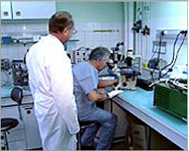Ebola vaccine developed
The United States has developed an experimental vaccine believed to be capable of protecting primates from the Ebola virus in what is seen as a major breakthrough in fighting one of the deadliest diseases known to humans.

Ebola, which has already ravaged a number of African countries, kills as many as 90% of its victims.
“This research has enormous public health implications not only because it might be used to limit the spread of Ebola virus…but also because this vaccine strategy may be applied to other highly lethal viruses, such as the Marburg and Lassa fever viruses and the SARS corona virus,” said director of the National Institute of Allergy and Infectious Diseases Anthony Fauci.
Ebola is a hemorrhagic fever that turns tissue into mush. It was first identified in 1976 in southwestern Sudan and in a nearby region of Zaire, as Congo was then called, where it killed 564 people, according to the World Health Organisation (WHO).
The National Institutes of Health said on Wednesday the fast-acting vaccine was successfully tested on eight macaque monkeys. It may allow scientists to quickly contain deadly Ebola breakouts with ring vaccinations, a method used in the past to fight smallpox.
The experiment is also perceived as an important step toward boosting defences against biological “terrorism”.
However, the vaccine requiring one shot has not been tested on humans. But scientists insisted that medicines effective on primates usually have a high likelihood of working on humans.
Method
 |
|
The breakthrough could be |
The breakthrough occurred when researches from the Dale and Betty Bumpers Vaccine Research Centre decided to use findings obtained in the course of their work on the so-called “prime-boost” vaccine strategy.
This strategy involves injecting non-infectious genetic material from the disease-causing microbe into a body to prepare its immune system.
A second injection, a few weeks later, delivers weakened carrier viruses containing key genes from the microbe itself, which usually substantially boosts the immune response.
As they worked on the Ebola vaccine the scientists decided to make a shortcut to the second stage of the process, trading off a weaker immune response for time, which is a critical factor in combating the fast-spreading disease.
Each of the eight monkeys was given a single boost injection, consisting of weakened carrier viruses containing genes for Ebola antigens, said health officials.
After a month they were injected with various doses of an Ebola virus strain obtained in 1995 from a fatally infected person in what is now the Democratic Republic of Congo.
The shots saved the lives of all eight, including those who received higher does of the virus, according to the officials.